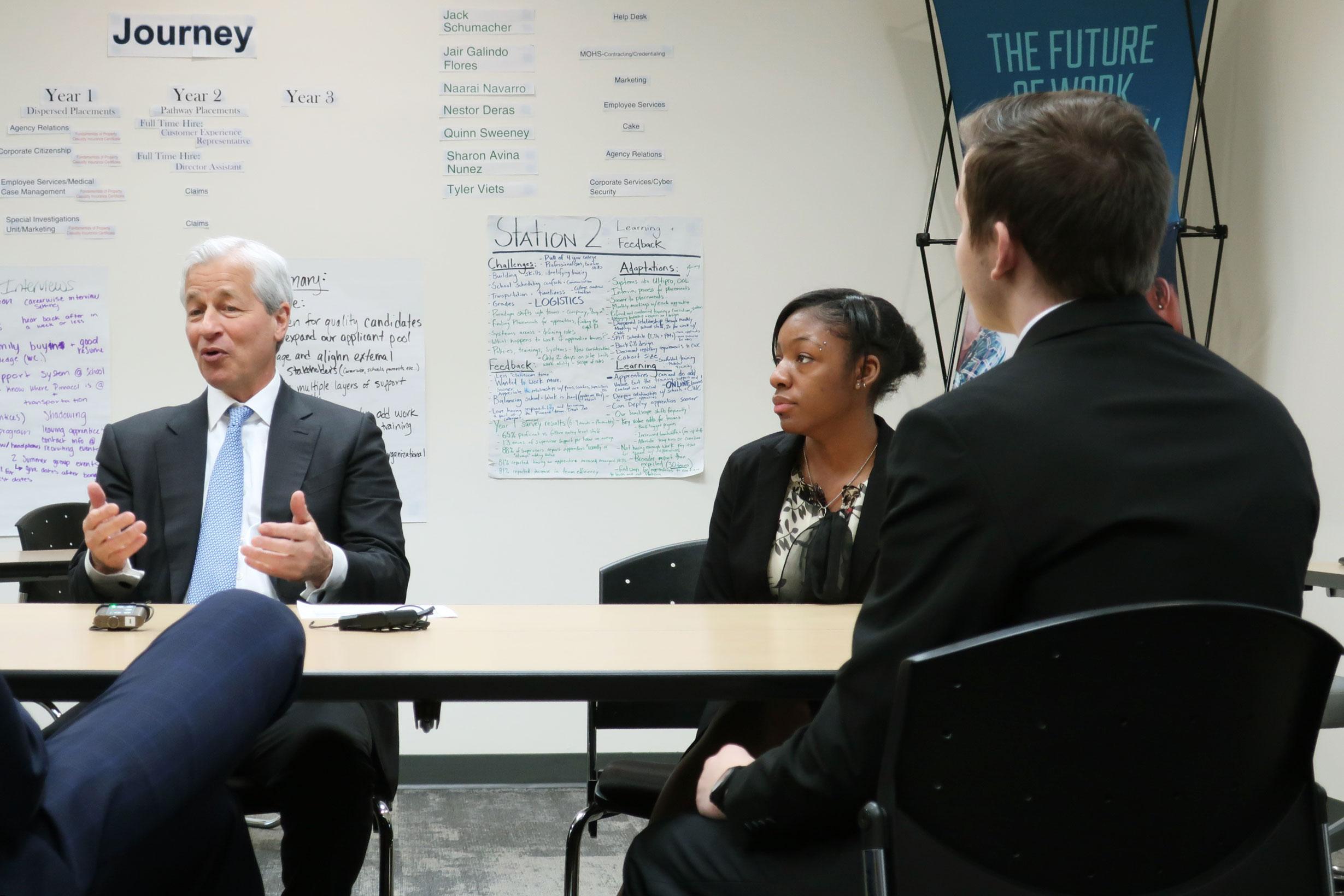
Denver will receive a $7 million investment over five years to help prepare young people for the future of work.
The city will join nine others in implementing programs to tackle youth unemployment and expand access to underserved young people in high school as part of JPMorgan Chase's global skills readiness initiative.
“Too many young people are being left behind without the education, skills and experienced needed to get well-paying jobs,” said Jamie Dimon, chairman and CEO of JPMorgan Chase.
Dimon spoke before business, education, and city leaders Wednesday at Pinnacol Assurance, a provider of worker’s compensation.
Pinnacol Assurance benefited from the impact of a previous JPMorgan Chase grant. Four years ago, Denver Public Schools received a $4 million investment from JPMorgan Chase to develop career pathways for students, including the chance to complete an apprenticeship at a company while still in high school.
Now, Pinnacol has 20 apprentices, mostly from Denver Public Schools. Apprentices receive industry certification upon completion of their 3-year apprenticeship and the new full-time hires have the option of studying for degrees as they continue working full-time.
Dimon noted that nearly a fifth of Pinnacol’s workforce are apprentices.
“If five percent of every company in America did that, we wouldn’t have a problem in our inner cities in America,” Dimon said. “There have been a lot of people left behind. It’s generation after generation. It’s not right.”
The total investment in the 10 cities is $75 million.
With the funds, Denver Pubic Schools, Metro State University, the University of Colorado Denver and others can collaborate to continue to expand underserved students' access to higher education and work experiences that lead to high-wage, in-demand jobs in fields like business, advanced manufacturing, health care and cyber-security.
Currently, DPS’s CareerConnect program partners more than 200 companies that offer real-world jobs for more than 4,000 students.
Officials says job training for high school students is crucial in part because of the lack of skilled workers in Colorado. Rapid changes in technology, automation and artificial intelligence are exacerbating the disconnect between the skills students have and the skills available jobs demand.
Sarah Steinberg, who leads JPMorgan Chase’s global career readiness initiative, said Colorado has low unemployment, a strong economy and the ability to attract people from around the world. But those factors mask the fact that fewer than half of DPS graduates go on to obtain a post-secondary credential, though 86 percent of top jobs require some training beyond high school, Steinberg said.
Pinnacol's apprentices have worked on the company’s business intelligence, auditing, agent relations and legal teams.
Third-year apprentice Angela Mendoza, who works in the company’s legal department, said in high school, many kids think about being a doctor or lawyer or nothing at all. Too many kids don’t know about the vast range of job opportunities out there, Mendoza said.
Eric Miller has worked on Pinnacol's business intelligence team, building automation software. He almost dropped out of high school because he felt like it was just preparing him to take tests.
He’s appreciated getting professional experience and “realizing the difference between your average high school job and an actual corporation has been huge.”
Monique Lane says she’s grown professionally and will have an associate’s degree by the time she finishes her apprenticeship. She has lots of options now, including continuing to work full-time at Pinnacol, leaving to pursue a degree or doing both at the same time, allowing the company to pay for part of her degree.
Having a career and technical education focus in high school increases the chance of graduation for at-risk students. The odds of on-time graduation for at-risk DPS students increased by 40 percent when they participated in two to five DPS’s CareerConnect courses or immersive work-based summer learning. The odds for graduation increased by 90 percent for those who participated in over five DPS CareerConnect courses.
DPS Superintendent Susana Cordova says the investment will help DPS “dramatically rethink how kids experience learning.”
“Our goal is to expose our students to as many careers as soon as possible,” Cordova said. “Our students only know what they can see.”









